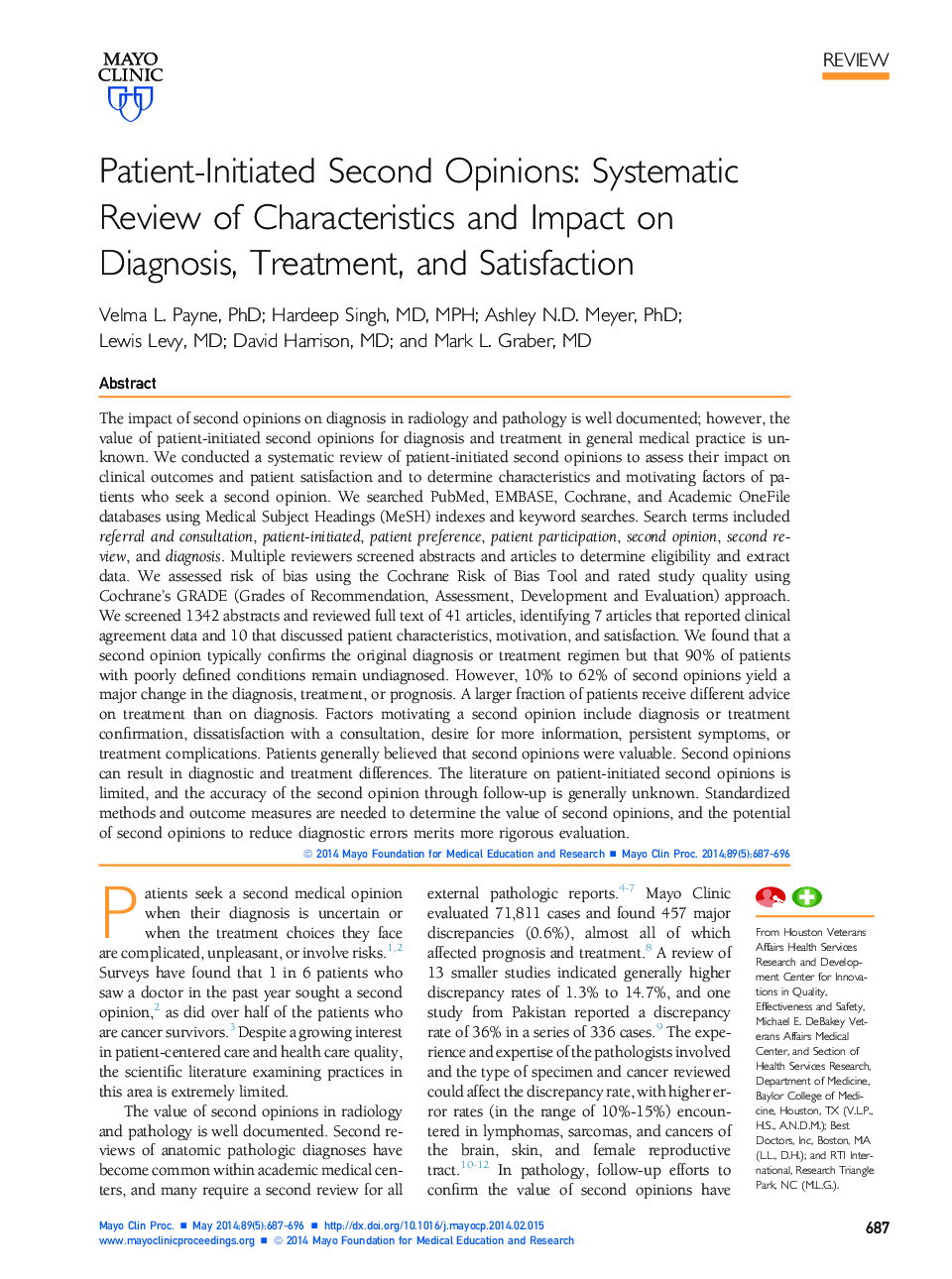| کد مقاله | کد نشریه | سال انتشار | مقاله انگلیسی | نسخه تمام متن |
|---|---|---|---|---|
| 10165792 | 1180271 | 2014 | 10 صفحه PDF | دانلود رایگان |
عنوان انگلیسی مقاله ISI
Patient-Initiated Second Opinions: Systematic Review of Characteristics and Impact on Diagnosis, Treatment, and Satisfaction
ترجمه فارسی عنوان
نظرات دوم بیمار آغاز شده: بررسی سیستماتیک ویژگی ها و تاثیر آن بر تشخیص، درمان و رضایت
دانلود مقاله + سفارش ترجمه
دانلود مقاله ISI انگلیسی
رایگان برای ایرانیان
کلمات کلیدی
موضوعات مرتبط
علوم پزشکی و سلامت
پزشکی و دندانپزشکی
کاردیولوژی و پزشکی قلب و عروق
چکیده انگلیسی
The impact of second opinions on diagnosis in radiology and pathology is well documented; however, the value of patient-initiated second opinions for diagnosis and treatment in general medical practice is unknown. We conducted a systematic review of patient-initiated second opinions to assess their impact on clinical outcomes and patient satisfaction and to determine characteristics and motivating factors of patients who seek a second opinion. We searched PubMed, EMBASE, Cochrane, and Academic OneFile databases using Medical Subject Headings (MeSH) indexes and keyword searches. Search terms included referral and consultation, patient-initiated, patient preference, patient participation, second opinion, second review, and diagnosis. Multiple reviewers screened abstracts and articles to determine eligibility and extract data. We assessed risk of bias using the Cochrane Risk of Bias Tool and rated study quality using Cochrane's GRADE (Grades of Recommendation, Assessment, Development and Evaluation) approach. We screened 1342 abstracts and reviewed full text of 41 articles, identifying 7 articles that reported clinical agreement data and 10 that discussed patient characteristics, motivation, and satisfaction. We found that a second opinion typically confirms the original diagnosis or treatment regimen but that 90% of patients with poorly defined conditions remain undiagnosed. However, 10% to 62% of second opinions yield a major change in the diagnosis, treatment, or prognosis. A larger fraction of patients receive different advice on treatment than on diagnosis. Factors motivating a second opinion include diagnosis or treatment confirmation, dissatisfaction with a consultation, desire for more information, persistent symptoms, or treatment complications. Patients generally believed that second opinions were valuable. Second opinions can result in diagnostic and treatment differences. The literature on patient-initiated second opinions is limited, and the accuracy of the second opinion through follow-up is generally unknown. Standardized methods and outcome measures are needed to determine the value of second opinions, and the potential of second opinions to reduce diagnostic errors merits more rigorous evaluation.
ناشر
Database: Elsevier - ScienceDirect (ساینس دایرکت)
Journal: Mayo Clinic Proceedings - Volume 89, Issue 5, May 2014, Pages 687-696
Journal: Mayo Clinic Proceedings - Volume 89, Issue 5, May 2014, Pages 687-696
نویسندگان
Velma L. PhD, Hardeep MD, MPH, Ashley N.D. PhD, Lewis MD, David MD, Mark L. MD,
